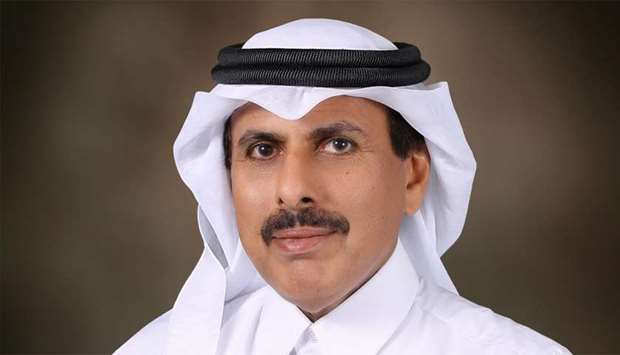HE the Governor of Qatar Central Bank (QCB) Sheikh Abdullah bin Saoud al-Thani said that the celebration of Qatar's National Day, which falls on December 18 each year, indicates that we did not and will not forget the great sacrifices made by the Founder and ancestors to achieve unity.
In statements to Qatar News Agency (QNA) on the occasion of Qatar National Day, the QCB Governor said: "The celebration of this glorious day of our history is a confirmation of our recognition of this day's distinctive nature, when our ancestors united to choose a seasoned leader to lead their triumphant march".
"The most important lessons to be learned from this occasion is that the celebrations allow our youth to learn about the hardship faced by our ancestors and the sacrifices they made in order to pave the way for us and future generations. The celebrations also instill in the them the ideals and great hopes that built our beloved country to enable them to follow the same approach, and emphasise the importance of choosing a wise, courageous and honest leader who maintains the interest of his people".
He said Qatar has faced many external dangers from neighbouring countries who tried to tear apart its unity and infringe on its sovereignty. "The people of this country, who believed in its unity and pride, were motivated to unite behind their wise leadership against the aggressors, in the past, and their attempts to dominate and control the state and its wealth, as is currently the case with the blockading countries".
HE Sheikh Abdullah bin Saoud al-Thani stressed that Qatar has made great progress in various fields since its independence. In the economic field, the country has achieved one of the fastest economic booms in modern history. Its GDP jumped from about QR10bn in 1975 to more than QR600bn now. It is currently the largest producer of liquefied gas in the world. It also has an advanced industrial sector, especially in the field of petrochemicals, iron, steel and aluminum, thus enjoying the highest per capita income in the world, in addition to having one of the strongest sovereign funds in the world.
He pointed out that the achievements were not limited to major economic boom; it extended to urban developments throughout the country as a result of the insightful vision of the leadership. During the past decade, the country has been able to modernise its infrastructure and establish extensive and modern networks of roads and bridges. Additionally, it has a large collection of modern hospitals, research centres, health centres and universities, in addition to the best seaport and airport and airline in the region.
He added that despite the unjust blockade imposed on Qatar for more than two years, the country has become stronger than before due to the wise leadership of His Highness the Amir Sheikh Tamim bin Hamad al-Thani and the combined efforts of all the authorities and the support of the State to all sectors.
"Our economy is even stronger today than it was before the blockade. The state budget is currently experiencing a surplus after it had a deficit. Furthermore, the current account balance of payments is also witnessing a large surplus, which reflected positively on the international reserves and liquidity in foreign currency at Qatar Central Bank that declined by more than 20% during the first months of the blockade. International reserves and liquidity recorded at the end of October of this year was about $54.2bn, exceeding what it recorded before the unjust blockade when it was $45.7bn at the end of May 2017.
Regarding the efforts that come within the framework of the implementation of the Qatar National Vision 2030 and the current National Development Strategy 2017-2022, the Governor of QCB stated that the Bank, Qatar Financial Markets Authority and Qatar Financial Centre Regulatory Authority launched The Second Strategic Plan for Financial Sector Regulation. This plan includes five main objectives: strengthening financial sector supervision and regulatory co-operation, developing financial markets and promoting financial innovation, maintaining the integrity of the financial system, promoting financial inclusion and developing human capital.
To achieve these objectives, the financial sector regulators are committed to interacting with changing economic conditions and facing emerging challenges, he said.

